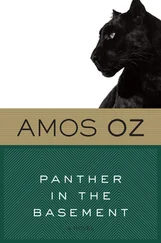Amos Oz - Where the Jackals Howl
Здесь есть возможность читать онлайн «Amos Oz - Where the Jackals Howl» весь текст электронной книги совершенно бесплатно (целиком полную версию без сокращений). В некоторых случаях можно слушать аудио, скачать через торрент в формате fb2 и присутствует краткое содержание. Год выпуска: 2012, Издательство: Houghton Mifflin Harcourt, Жанр: Современная проза, на английском языке. Описание произведения, (предисловие) а так же отзывы посетителей доступны на портале библиотеки ЛибКат.
- Название:Where the Jackals Howl
- Автор:
- Издательство:Houghton Mifflin Harcourt
- Жанр:
- Год:2012
- ISBN:нет данных
- Рейтинг книги:4 / 5. Голосов: 1
-
Избранное:Добавить в избранное
- Отзывы:
-
Ваша оценка:
- 80
- 1
- 2
- 3
- 4
- 5
Where the Jackals Howl: краткое содержание, описание и аннотация
Предлагаем к чтению аннотацию, описание, краткое содержание или предисловие (зависит от того, что написал сам автор книги «Where the Jackals Howl»). Если вы не нашли необходимую информацию о книге — напишите в комментариях, мы постараемся отыскать её.
Where the Jackals Howl — читать онлайн бесплатно полную книгу (весь текст) целиком
Ниже представлен текст книги, разбитый по страницам. Система сохранения места последней прочитанной страницы, позволяет с удобством читать онлайн бесплатно книгу «Where the Jackals Howl», без необходимости каждый раз заново искать на чём Вы остановились. Поставьте закладку, и сможете в любой момент перейти на страницу, на которой закончили чтение.
Интервал:
Закладка:
If one of the men suddenly stared at her sideways, with gaping eyes and parted lips and the tip of his tongue protruding between his teeth, Pitdah would laugh aloud. And if Jephthah caught sight of the man staring at his daughter and his eyes began to flash cold rage, Pitdah would move her eyes back and forth between them as though drawing a line, laughing louder than ever. Even when he shouted, That’s enough, she could not stop laughing; sometimes she would infect him with her laughter and he could not stop, either. The young nomads interpreted all this as a sign of happiness, but the women considered it something that would not end well. The nomads’ wives taught Pitdah to weave and cook and milk goats, and to tame a stubborn billy goat. The girl could do all these things easily, and her thoughts always seemed to be far away.
Once she said to her father Jephthah:
“At night you go out to fight and you win, and in the daytime you sleep, and then even the flies on your face are stronger than you are.”
Jephthah said:
“Everybody has to sleep.”
Pitdah said:
“Snakes never sleep; they can’t even close their eyes, because they have no eyelids.”
Jephthah said:
“It is written in the holy writings that the snake is more cunning than any other beast of the field.”
Pitdah:
“How sad to be more cunning than any other beast of the field. And how sad never to sleep and never to close your eyes and dream at night. If the snake was really cunning, it would find a way to close its eyes.”
“What about you.”
“I love watching you sleeping on the ground after your night fights, with the flies walking all over your face. I love you, Father. And I love myself, too. And the places where you never take me, where the sun sets in the evening. You have forgotten the sea, but I remember. Now, put this cloak over your head and moo, and I’ll watch you and laugh.”
In his dreams Jephthah saw a procession of princes and powerful men coming to ask him for his daughter’s hand. Their faces were crooked; like dogs they must be chased away with a stick or a stone, because Pitdah was not for them. Very slowly and heavily his father Gilead appeared in Jephthah’s dreams, and he, too, put out his broad, rough hand to touch Pitdah and she ran away from him and hid behind the troughs and he ran after her and Jephthah cried out in his sleep. Or else the boys appeared, Azur and Jamin and Gatel and Jemuel, and they surrounded Pitdah in his dream with hundreds of white fingers to tear off her clothes and she laughed with them and he screamed at the sight of them because they had no eyelids and their eyes were wide open and gaping at her not closing not blinking and they closed around her and he woke up with a cry and found that he was holding the dagger and his hand was shaking.
Touch me, O God, you have not touched me yet, how long shall we wait for you. Reach out for me with your hand and with fingers of fire. Here I am before you upon one of the mountains, holding the lamb for a burnt offering, and behold the fire and the wood, but where is the knife. I shall desire your shadow all the days of my life. If you appear in the mountain I shall be burning dust. If you shine forth in the crescent moon or in the reflection of the moon in water, there your servant will be in the white sands or in the depths of the water. If the dogs howl and pour out their hearts in their howling, that is a sign that you are loving and wrathful. Send me your wrath, O God, and let me be touched by it, surely you are a solitary God and I, too, am all alone. You shall have no other servant before me. I am your son and I shall bear witness all my life to your inscrutable terrors, O Lord of the wildcat stalking the lifeless riverbeds by night, night after night.
In the course of time Jephthah became the chieftain of the nomads. He spoke little, and when he did speak his voice was very soft. Anyone who wanted to hear him had to lean toward him and listen attentively.
At that time the king of Ammon invaded the land of Israel. He conquered all the cities and farms and made slaves of their inhabitants. Some managed to escape, but the rest were under the sway of King Gatel. The king never left his palace, but passed his time filling scroll after scroll with orders for his generals, and also writing the Book of the Wars of King Gatel.
One day Jephthah’s three brothers, Jamin, Jemuel, and Azur, came to the desert to the Land of Tob, to the place where Jephthah dwelt. They were fleeing from the Ammonites and they had come here because Jephthah’s fame had spread all over the land, as he and his nomad band, the Jephthahites, snapped at the heels of the Ammonite army, robbing the caravans and flouting the king’s guards like a bird playing with a bear.
Jephthah did not conceal his identity from his brothers. But neither did he fall on their necks and weep. With the passage of the years his two eldest brothers had become even coarser. Jamin, the eldest, was now a heavily built, corpulent man who resembled neither his father nor his mother but looked more like the household priest. Jemuel could not rid his face of an obsequious smile accompanied by a lecherous wink, which seemed to be saying, Come over to my house, my friend, and let’s have an orgy. Only the youngest brother, Azur, had developed the speed and sharpness of an arrow in flight; he resembled his half-brother the son of the Ammonite woman, rather than the two sons of Nehushtah daughter of Zebulun.
When the three brothers had bowed down and prostrated themselves before the nomad chief, Jephthah said:
“Rise, fugitives. Do not bow down to me. I am not Joseph and you are not the sons of Jacob. Stand up. At once.”
Jamin, the eldest, spoke as though reading from a written text:
“My lord, we have come to tell you that the Ammonite foe has conquered your father’s estate. And now our father is an old man and cannot fight against them. We, your servants, say to you: Arise, Jephthah, rescue your father’s house and your father’s land, for only you and no other can defeat the Ammonite serpent.”
They pleaded with Jephthah and Jephthah said nothing. He merely ordered that they be accepted into his band. Day by day they said to him: How long will our lord tarry. He did not answer them and he did not rebuke them. In his heart he said, O God, grant me a sign.
The Jephthahites harried the armies of Ammon. Fear and panic seized the city of Abel-Keramim at night because of the Jephthahites who raided the caravans. Jephthah’s men were as swift and cunning as their lord. His footsteps at night were like a breeze or a caress. He sent silent-knived assassins by night to the Ammonite captains. Gatel’s soldiers were seized by terror whenever they heard at night the sound of a breeze or a wolf or a bird of prey, lest it be Jephthah’s nomads in the night making the sound of bird or wolf or breeze. The Jephthahites penetrated the walls of Rabbat-Ammon and infiltrated the squares of Abel-Keramim and its temples: they entered the city by day with the caravans, disguised as merchants, by night they sowed panic, and in the morning they were borne away by the wind and were no more, and time and again Gatel sent forth his army to pursue the wind. In the book of his wars King Gatel wrote:
“Surely this is the way of the fainthearted, to strike and to flee. Let them come by the light of day, let us meet face to face, and I shall crush them and have peace.”
But the Jephthahites did not choose to come by daylight. Day by day the lord of the nomads went out and stood alone on the hill, with his back toward the camp and his face toward the wilderness, as though waiting for some sound or scent.
Then King Gatel sent word to Jephthah:
“You are an Ammonite, Jephthah. We are brothers. Why are we fighting each other? If you choose, come and I shall place you in my second chariot, and none shall lift up hand or foot without your word in all the cities of Ammon and of Israel.”
Читать дальшеИнтервал:
Закладка:
Похожие книги на «Where the Jackals Howl»
Представляем Вашему вниманию похожие книги на «Where the Jackals Howl» списком для выбора. Мы отобрали схожую по названию и смыслу литературу в надежде предоставить читателям больше вариантов отыскать новые, интересные, ещё непрочитанные произведения.
Обсуждение, отзывы о книге «Where the Jackals Howl» и просто собственные мнения читателей. Оставьте ваши комментарии, напишите, что Вы думаете о произведении, его смысле или главных героях. Укажите что конкретно понравилось, а что нет, и почему Вы так считаете.












